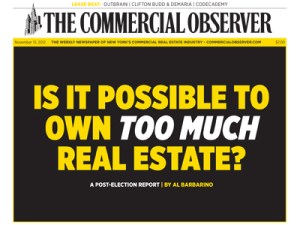Reaching for the Sun: Is It Possible to Own Too Much Real Estate?
By Al Barbarino November 13, 2012 7:00 am
reprintsWhen the credit crisis hit and the real estate market all but collapsed, news of disgraced developers became commonplace, their tales more often than not layered with intrigue.
Take Kent Swig, who, after being divorced by his wife, filed an affidavit in May responding to a lawsuit filed by his ex-father-in-law, industry luminary Harry Macklowe, arguing that Mr. Macklowe embarked on a “vendetta” aimed at “starving” him of every last penny.
But as the downfalls of real estate tycoons like Mr. Macklowe, Shaya Boymelgreen, Bruce Eichner and Larry Gluck stack up like so many new developments across Manhattan’s skyline, analysts and the city’s landlords themselves have begun to wonder aloud if there’s a limit to how much real estate can be accumulated.
“A developer’s function is to develop property, and sometimes they develop and develop until they can’t develop anymore,” said appraiser Jonathan Miller of Miller Samuel Inc., a real estate appraisal and consulting firm based in New York City. “Where people fell short was that the market was more powerful than them … the market is brutal, and it has no compassion.”
 With President Obama elected to four more years in the White House, a juggernaut exists in the looming Bush tax-cut deadline. Nobody knows for sure whether the cuts will expire, but as it stands, if Congress does nothing, capital gains taxes will increase from 15 percent to as much as 28.8 percent, including surcharges, tax experts said.
With President Obama elected to four more years in the White House, a juggernaut exists in the looming Bush tax-cut deadline. Nobody knows for sure whether the cuts will expire, but as it stands, if Congress does nothing, capital gains taxes will increase from 15 percent to as much as 28.8 percent, including surcharges, tax experts said.
Depending on which side of the aisle you’re on—Republican or Democrat—the expiration is expected to either hurt or stimulate the economy. Some believe that in order to erase the massive national debt ($16,260,682,814,332.77 at press time), the country has no other option but to increase taxes. Opponents of the hikes believe that if the wealthiest taxpayers have less money, they’ll spend less on consumer goods, restaurants and, perhaps, real estate.
Either way, brokers are scrambling to push deals before the end of the year, to some degree playing off fears of the tax deadline—and some people are making decisions as though the expiration is a certainty.
“Since the summer, we’ve seen unusually heavy volume of high-end property owners who are transferring properties” as the tax deadline approaches, Mr. Miller said, adding that this leads to an “artificial compression of the market.”
One broker wrote in an email that was sent out to a group of clients and later obtained by The Commercial Observer that “Since the low capital gains taxes are expiring soon, I would say that it’s in your clients’ best interest to reach an agreement before 2012 … I would think it’s in your best interest also to close in 2012.”
The good news is that the shrewdest of investors—and perhaps the luckiest—will rise to the occasion, navigating the real estate terrain with intelligence and vision, which most likely means running business as usual and paying little attention to the tax deadline.
“The traditional developers and real estate families hang on for generations—no one-term presidency or Congress is going to affect them,” said the real estate attorney Adam Leitman Bailey. But, he added, there are those who treat investments “like ATM machines and who are not making the most intelligent investments … that is a different world.”



